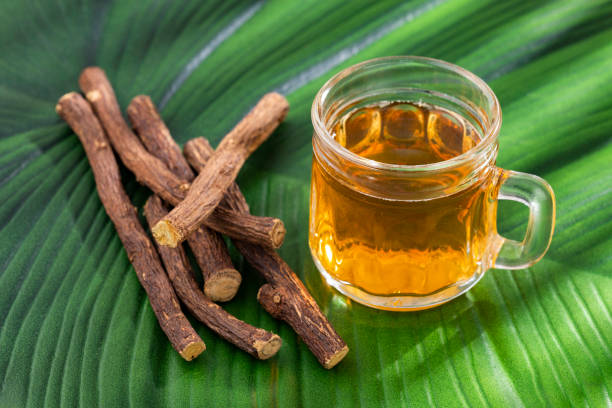Liquorice (glycyrrhizin) is a plant that contains over 300 compounds and is used to prevent and treat several illnesses. It is grown naturally in certain Asian and European countries, but it is available as branded supplements worldwide.
Liquorice has high anti-inflammatory, antimicrobial and antioxidant properties; it reduces cough, sore throat and swelling and promotes the healing of ulcers. It is also used to treat a variety of skin conditions, such as eczema and acne.
Dosage
Liquorice supplement comes in different forms, which can be topical gels, powders, capsules, teas, and tinctures. The plant itself can be used directly, either fresh or dried.
Currently, there’s no standard recommendation for the dosage of liquorice. Still, the WHO and SCF have recommended a limit of 100mg a day for glycyrrhizin, the major active compound found in liquorice.
However, since you can’t precisely determine the amount of glycyrrhizin in liquorice, you may not know if you are taking too much, so discuss your health condition with a healthcare provider to identify safe amounts and effective doses of liquorice suitable for your health.
Liquorice supplements are also available as Deglycyrrhizinated Liquorice (DGL) capsules or powders, which means it is free of glycyrrhizin, which is responsible for most of its side effects. However, this compound is also responsible for many of its benefits as well, so removing it may make the supplement less effective.
Side Effects of liquorice
Liquorice supplement is safe to consume in appropriate amounts, but overconsumption can cause some complications and health issues.
The side effects or complications from liquorice are due to the excessive consumption of glycyrrhizin; it can increase the stress hormone called cortisol, and in severe cases, it can lead to arrhythmia, hypertension and possibly cardiac arrest.
That is why some liquorice supplements are deglycyrrhizinated, but they may not give the same positive effect. So it is best you consume liquorice in appropriate amounts to avoid side effects and still get its full benefits.
Precautions
It is unsafe to consume large amounts of liquorice that contain glycyrrhizin for a long time, and it is not advisable to use the topical gel for more than two weeks.
It is unsafe to take liquorice during pregnancy; it may result in miscarriage or early delivery. Also, it is not confirmed whether or not liquorice is suitable for breastfeeding mothers, so you need to consult a doctor before using it.
Liquorice can increase water retention and the risk of irregular heartbeat. So do not consume liquorice if you have any heart condition.
People with hormone-sensitive conditions such as uterine cancer, uterine fibroids, breast cancer, endometriosis, or ovarian cancer should not use liquorice. It might act like estrogen in the body, and most of these conditions do not react well to estrogen exposure.
Liquorice can also raise blood pressure, so if you have high blood pressure, do not consume high amounts of liquorice.
Avoid liquorice if you have hypertonia or hypokalemia because it can lower potassium levels and worsen hypertonia. Liquorice can also cause sexual problems, like worsened erectile dysfunction and decreased libido, and can make kidney disease worse.
Stop taking liquorice two weeks before any surgery as it may make it difficult to control blood pressure.



